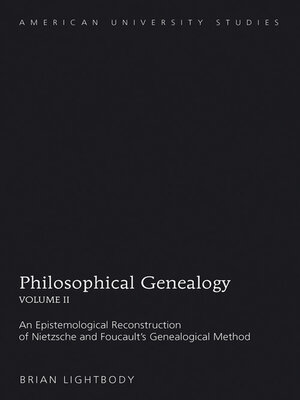Philosophical Genealogy- Volume II
ebook ∣ An Epistemological Reconstruction of Nietzsche and Foucault's Genealogical Method · American University Studies
By Brian Lightbody

Sign up to save your library
With an OverDrive account, you can save your favorite libraries for at-a-glance information about availability. Find out more about OverDrive accounts.
Find this title in Libby, the library reading app by OverDrive.



Search for a digital library with this title
Title found at these libraries:
| Library Name | Distance |
|---|---|
| Loading... |
Philosophical genealogy is a distinct method of historical and philosophical inquiry that was developed by the nineteenth-century philosopher, Friedrich Nietzsche, and subsequently adopted and extended by the twentieth-century philosopher, Michel Foucault. In brief, genealogies critically examine the historical origin of philosophical concepts, ideas and practices. They challenge the value of traditional methods of philosophical inquiry along with the results that these inquiries produce.
Philosophical Genealogy Volume I: An Epistemological Reconstruction of the Genealogical Method explored the three axes of the genealogical method: power, truth and the ethical. In addition, various ontological and epistemic problems pertaining to each of these axes were examined. In Philosophical Genealogy Volume II: An Epistemological Reconstruction of the Genealogical Method, these problems are now resolved. Volume II establishes what requisite ontological underpinnings are required in order to provide a successful, epistemic reconstruction of the genealogical method. Problems regarding the nature of the body, the relation between power and resistance as well as the justification of Nietzschean perspectivism, are now all clearly answered. It is shown that genealogy is a profound, fecund and, most importantly, coherent method of philosophical and historical investigation which may produce many new discoveries in the fields of ethics and moral inquiry provided it is correctly employed.
Philosophical Genealogy Volume I: An Epistemological Reconstruction of the Genealogical Method explored the three axes of the genealogical method: power, truth and the ethical. In addition, various ontological and epistemic problems pertaining to each of these axes were examined. In Philosophical Genealogy Volume II: An Epistemological Reconstruction of the Genealogical Method, these problems are now resolved. Volume II establishes what requisite ontological underpinnings are required in order to provide a successful, epistemic reconstruction of the genealogical method. Problems regarding the nature of the body, the relation between power and resistance as well as the justification of Nietzschean perspectivism, are now all clearly answered. It is shown that genealogy is a profound, fecund and, most importantly, coherent method of philosophical and historical investigation which may produce many new discoveries in the fields of ethics and moral inquiry provided it is correctly employed.







